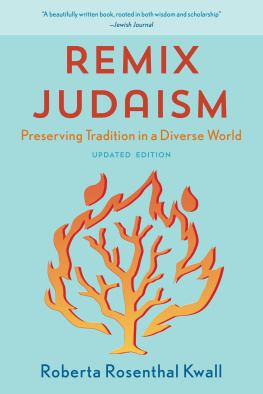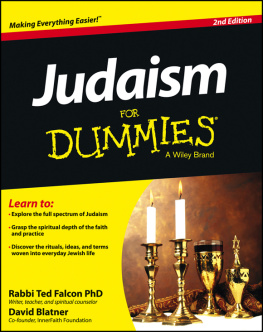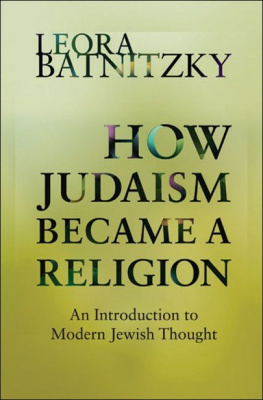More praise for American Judaism: A History, by Jonathan D. Sarna
Masterful.... [Sarna] writes in a style that brings his knowledge and ideas alive to a wide spectrum of readers, Jewish and non-Jewish, scholars and lay people. This book is destined to be the new classic of American Jewish history.Norman H. Finkelstein, Jewish Book World
The most comprehensive single-volume examination of the Jewish religion on American soil yet written.... An unparalleled work.
Allan Nadler, The New Leader
The first stop for scholars and students interested in exploring the religious dimensions of Jewish life in America.... Masterful.
Jeffrey S. Gurock, American Historical Review
American Judaism provides a comprehensive and insightful portrait of the American Jewish experience. Sarna is magisterial as well as accessible in this work, and American Judaism will serve as the standard book in the field. American Judaism indicates why Sarna has earned his reputation as the premier American Jewish historian of his generation.
Rabbi David Ellenson, president, Hebrew Union CollegeJewish Institute of Religion
A masterfully contextualized synthesis with exactly the right focus, full of elegance, empathy, and insight.Ismar Schorsch, chancellor, Jewish Theological Seminary of America
Jonathan Sarna has given us a rich, comprehensive history of Judaisms story in America. It is a lucid, insightful, engaging narrative of Judaisms journey through the American experience. Professor Sarna dispassionately relates the development of a passionate peoples struggle to adapt a timeless tradition to a bold new world. Even as he chronicles an array of challenges confronting Judaism in America, he points to successes and opportunities as we continue building an enduring history into the future.Richard M. Joel, president, Yeshiva University
American Judaism
JONATHAN D. SARNA
American Judaism
A HISTORY
Second Edition
Yale UNIVERSITY PRESS
New Haven & London
Published with assistance from the income of the Frederick John Kingsbury Memorial Fund and from the foundation established in memory of Amasa Stone Mather of the Class of 1907, Yale College.
First edition 2004. Second edition 2019.
Introduction to the Second Edition and Conclusion copyright 2019 by Jonathan D. Sarna.
Copyright 2004 by Yale University. All rights reserved.
This book may not be reproduced, in whole or in part, including illustrations, in any form (beyond that copying permitted by Sections 107 and 108 of the U.S. Copyright Law and except by reviewers for the public press), without written permission from the publishers.
Yale University Press books may be purchased in quantity for educational, business, or promotional use. For information, please e-mail sales. (U.K. office).
Designed by Nancy Ovedovitz.
Set in Monotype Times New Roman and M. Perpetua types by Newgen North America.
Printed in the United States of America.
Library of Congress Control Number: 2018959887
ISBN 978-0-300-19039-7 (paperback : alk. paper)
A catalogue record for this book is available from the British Library.
This paper meets the requirements of ANSI/NISO Z39.48-1992 (Permanence of Paper).
10 9 8 7 6 5 4 3 2 1
To Aaron Yehuda and Leah Livia
Our children shall be our sureties
Midrash Tanhuma, Vayigash, 2
Contents
Acknowledgments
The fact that this volume appears at all represents something of a miracle. In 1999, while the manuscript was in progress, I was diagnosed with esophageal cancer. Chemotherapy, radiation, and massive surgery followed, and in defiance of the odds, I survived. My first thanks, therefore, go to the doctors, nurses, relatives, friends, and colleagues who carried me through this ordeal, and especially to Drs. Michael Jaklitsch, David Kelsen, Andrea Ng, Michael Rabin, Nahum Vishniavsky, the nursing staff at the Brigham & Womens Hospital, the members of Congregation Shaarei Tefillah in Newton, my colleagues at Brandeis University, and the on-line esophageal cancer discussion list known as the EC-Group. Their collective faith is borne out by this volume, which demonstrates, among many other things, that there is life after cancer.
Beyond this, the volume represents the culmination of over thirty years of sustained interest in the history of American Judaism, a subject that first aroused my curiosity as a senior in high school. Along the way, I had the great good fortune to study under leading scholars at Brandeis and Yale, including Marshall Sklare, Leon Jick, Ben Halpern, Morton Keller, Kathleen Neils Conzen, Sydney Ahlstrom, and David Brion Davis. In the summer of 1977, I met for the first time the dean of American Jewish historians, Jacob Rader Marcus, and from then until the last days of his long life in 1995 he served as my teacher and mentor. For much of that time we also sat as colleagues on the faculty of the Hebrew Union CollegeJewish Institute of Religion in Cincinnati. Both Professors Ahlstrom and Marcus encouraged me to write this book; both felt that the religious history of the American Jew had been unduly neglected.
I approach the study of American Judaism from the perspective of an insider. I have spent my entire life involved in Orthodox, Conservative, and Reform Jewish institutions, and I maintain close friendships and family relationships across the full spectrum of Jewish life, from fervently Orthodox to radically secular. In writing about American Judaism, then, I am writing about a world that I know at first-hand. At the same time, my life has also been spent within the world of scholarship, a world that I was born into, as the son of a professor, and one that I happily continue to inhabit. In this book, as in all of my writing, I have endeavored to balance my passionate Jewish commitments with my dispassionate scholarly ones.
Numerous libraries and archives have assisted me with my research over the years. I single out for thanks the Brandeis University library, now home to the personal library of Jacob Rader Marcus; the Hebrew Union College libraries in Cincinnati and Jerusalem; the Jewish National Library at the Hebrew University in Jerusalem; the Jacob Rader Marcus Center of the American Jewish Archives in Cincinnati; the National Center for Jewish Film at Brandeis; and the American Jewish Historical Society, formerly at Brandeis and now part of the Center for Jewish History in New York.
Through the years I have received numerous grants and fellowships that have assisted me in my research. I am particularly grateful to the American Council of Learned Societies, the American Jewish Committee, the Lilly Endowment, the Memorial Foundation for Jewish Culture, the National Foundation for Jewish Culture, the Pew Trusts, and the Scheuer Foundation whose support (in some cases for projects with other objectives) made it possible for me to research aspects of American Jewish history that I would not otherwise have understood. The Joseph H. & Belle R. Braun Chair at Brandeis University, and especially a fund set up to accompany that chair by Larry and Nancy Glick, have been of immeasurable help to me through the years, and helped to finance the preparation of this volume for press, as well as the ordering of photographs. The actual writing began with support from a Fellowship for University Teachers awarded me by the National Endowment for the Humanities in 1996. I completed the bulk of the book in Jerusalem, where I was once again honored to receive a fellowship from the Lady Davis Fellowship Trust. More recently, generous grants from the Lucius N. Littauer Foundation and from the Dorothy and Julius Koppelman Institute on American Jewish-Israeli Relations of the American Jewish Committee have made it possible for this volume to be published in Israel in a Hebrew translation simultaneously with its English-language appearance.
Next page





